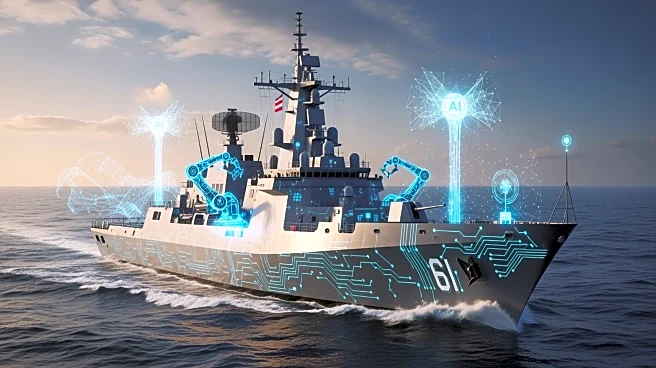What's Happening?
Metal Shark, a prominent Louisiana-based boat builder, has announced a strategic partnership with HavocAI, a leader in maritime swarm autonomy. This collaboration aims to integrate HavocAI's advanced collaborative
autonomy platform into Metal Shark's fleet of High Speed Maneuverable Unmanned Surface Vessels (HSMUSVs). The technology, already deployed with the U.S. Navy and Army, allows a single operator to manage complex operations involving multiple vessels simultaneously. Metal Shark has secured significant contracts with the U.S. Navy, Coast Guard, and Marine Corps, establishing itself as a key supplier of military vessels. The partnership is set to enhance the interoperability and lethality of U.S. military fleets through intelligent autonomous boat swarms.
Why It's Important?
The partnership between Metal Shark and HavocAI is crucial for advancing the autonomous capabilities of U.S. military fleets. By integrating HavocAI's technology, the military can conduct operations more efficiently and effectively, leveraging existing vessel investments while adding cutting-edge autonomous features. This collaboration addresses the critical need for heterogeneous fleet coordination, allowing mixed fleets to operate cohesively and maximize mission flexibility. The enhanced autonomy could significantly improve the U.S. military's operational capabilities, providing a strategic advantage in defense scenarios.
What's Next?
The partnership is expected to lead to further advancements in autonomous maritime technology, with potential expansions across diverse fleets. Metal Shark and HavocAI may continue to develop and deploy new autonomous platforms, enhancing the capabilities of U.S. and allied military forces. The collaboration could also influence future military procurement strategies, emphasizing the importance of interoperability and autonomous capabilities in defense operations.
Beyond the Headlines
This partnership highlights the growing importance of autonomous technology in military applications, potentially setting a precedent for future collaborations between technology firms and defense contractors. The integration of swarm autonomy into military fleets could lead to ethical and strategic discussions about the role of AI in warfare, including considerations of operational control and decision-making processes.











